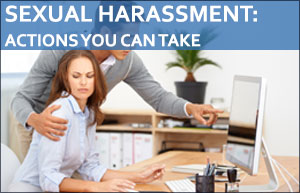SPEAK WITH A LAWYER TODAY
Can My Employer Demote Me Because I Reported Sexual Harassment?
Can My Employer Demote Me for Reporting Sexual Harassment?
It is illegal for employers to engage in sexual harassment, and employees who report such misconduct are legally protected from retaliation. If you reported sexual harassment in the workplace and were subsequently demoted, you may have grounds for a wrongful retaliation lawsuit. The California Labor Law Employment Attorneys Group is dedicated to ensuring that employers are held accountable for violating employee rights.
Sexual harassment is strictly prohibited under both federal and state laws. It is considered a form of sex discrimination and is a violation of federal workplace protections. Historically, women were the primary victims of workplace harassment, but over time, legal protections were enacted to safeguard all employees from such misconduct.
At the California Labor Law Employment Attorneys Group, we help employees who report workplace harassment and face unfair retaliation from their employers. We assist clients with concerns such as:
- Can my employer demote me for reporting sexual harassment?
- Can my boss cut my hours because I filed a sexual harassment lawsuit?
- I reported a hostile work environment, and now my salary has been reduced. Can they legally do that?
- Can I sue my employer if my pay was reduced after I filed a harassment complaint?
- Can I take legal action if my employer denied my bonuses in retaliation for a sexual harassment report?
- Can I sue if I was placed on furlough after reporting harassment?
Understanding Sexual Harassment in the Workplace
Sexual harassment is a form of sex discrimination and is illegal under the Civil Rights Act of 1964. The Equal Employment Opportunity Commission (EEOC) enforces these protections and investigates workplace discrimination claims.
Sexual harassment includes any unwelcome sexual advances, requests for sexual favors, or other verbal or physical conduct of a sexual nature. If such behavior interferes with an employee’s work performance or creates an intimidating, hostile, or offensive work environment, it is considered unlawful harassment.
The term “unwelcome” plays a crucial role in determining whether an incident qualifies as harassment. Conduct is deemed unwelcome if the recipient does not consent and finds the behavior inappropriate.
Sexual harassment laws protect both men and women. Harassers can be of any gender, and victims may be harassed by individuals of the same sex. For instance, if a male coworker uses homophobic slurs against another male employee, this can constitute sexual harassment.
Legal Protections Against Workplace Sexual Harassment
Title VII of the Civil Rights Act protects employees from workplace discrimination, including sex-based discrimination. Since courts recognize harassment as a form of discrimination, Title VII ensures that employees cannot be penalized for reporting inappropriate behavior.
Employers are prohibited from retaliating against employees who report sexual harassment. This means they cannot take negative employment actions such as demotion, termination, salary reduction, or any other form of punishment due to a complaint.
Can an Employer Retaliate Against Employees for Reporting Sexual Harassment?
Employers are legally prohibited from retaliating against employees for participating in protected legal activities. Reporting sexual harassment or discrimination is considered protected activity, meaning that employees cannot be punished for filing a complaint with Human Resources (HR) or an external agency such as the EEOC.
Retaliation can take many forms, including:
- Termination
- Salary reduction
- Demotion
- Unjustified job reassignment
- Loss of benefits or denied promotions
Additionally, employers cannot retaliate against employees who support or participate in a harassment investigation. For example, if you witnessed a coworker being sexually harassed and reported the incident, your employer cannot legally demote you in retaliation.
How Do I Prove That I Was Demoted for Reporting Sexual Harassment?
Employees can prove workplace retaliation using direct evidence or circumstantial evidence.
Direct Evidence: This is the strongest form of proof but can be difficult to obtain. It involves an employer explicitly admitting to retaliatory behavior. For example, if a supervisor states, “You are being demoted because you reported harassment,” that is clear-cut evidence of illegal retaliation.
Circumstantial Evidence: Since most employers understand that direct retaliation is illegal, they may attempt to hide their actions. Employees can still prove their case by showing circumstantial evidence that retaliation occurred.
To establish a circumstantial case, an employee must demonstrate the following:
- Engagement in protected activity: The employee reported sexual harassment or participated in an investigation.
- Adverse employment action: The employee experienced a demotion, termination, or other negative job-related consequences.
- Connection between the complaint and the retaliation: The timing and circumstances suggest that the employer took action as a response to the complaint.
For example, if an employee files a harassment complaint and is demoted the following week, the timing alone may be enough to suggest a link between the two events.
Legal Representation for Retaliation Cases
If you were demoted, fired, or otherwise punished for reporting workplace harassment, you have the right to take legal action. The California Labor Law Employment Attorneys Group is dedicated to helping employees who experience unlawful retaliation.
Free Consultation: We offer a free case evaluation to help you understand your rights and legal options.
Zero-Fee Guarantee: Our firm works on a contingency fee basis, meaning you will not pay any legal fees unless we successfully recover compensation for you.
Contact us today to schedule a consultation and learn how we can assist you in seeking justice.
Client Testimonial
“Great employment lawyers! They do exactly what they promise. Highly recommended!”
– Lucinda Teal
Client Review
“Great employment lawyers! They do what they say they’ll do! Highly recommend! You will not be dissapointed!”
– Lucinda Teal

100% FREE CASE CONSULTATION

OUR Guarantee
Pay NO FEES until we win your Employment case.

Client Review
California Labor Law Employment Attorneys Group
5 out of 5
This can be an ugly world and it is nice knowing lawyers such as Daniel to help people right a wrong when they have suffered at the hands of their employer. Daniel is one of the good guys out there and I strongly recommend his skills as an employment lawyer.
– Hoagland Stubbs